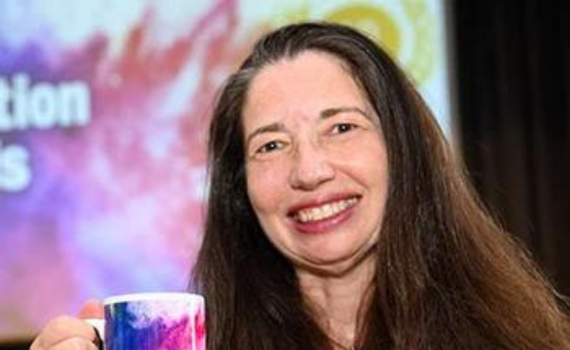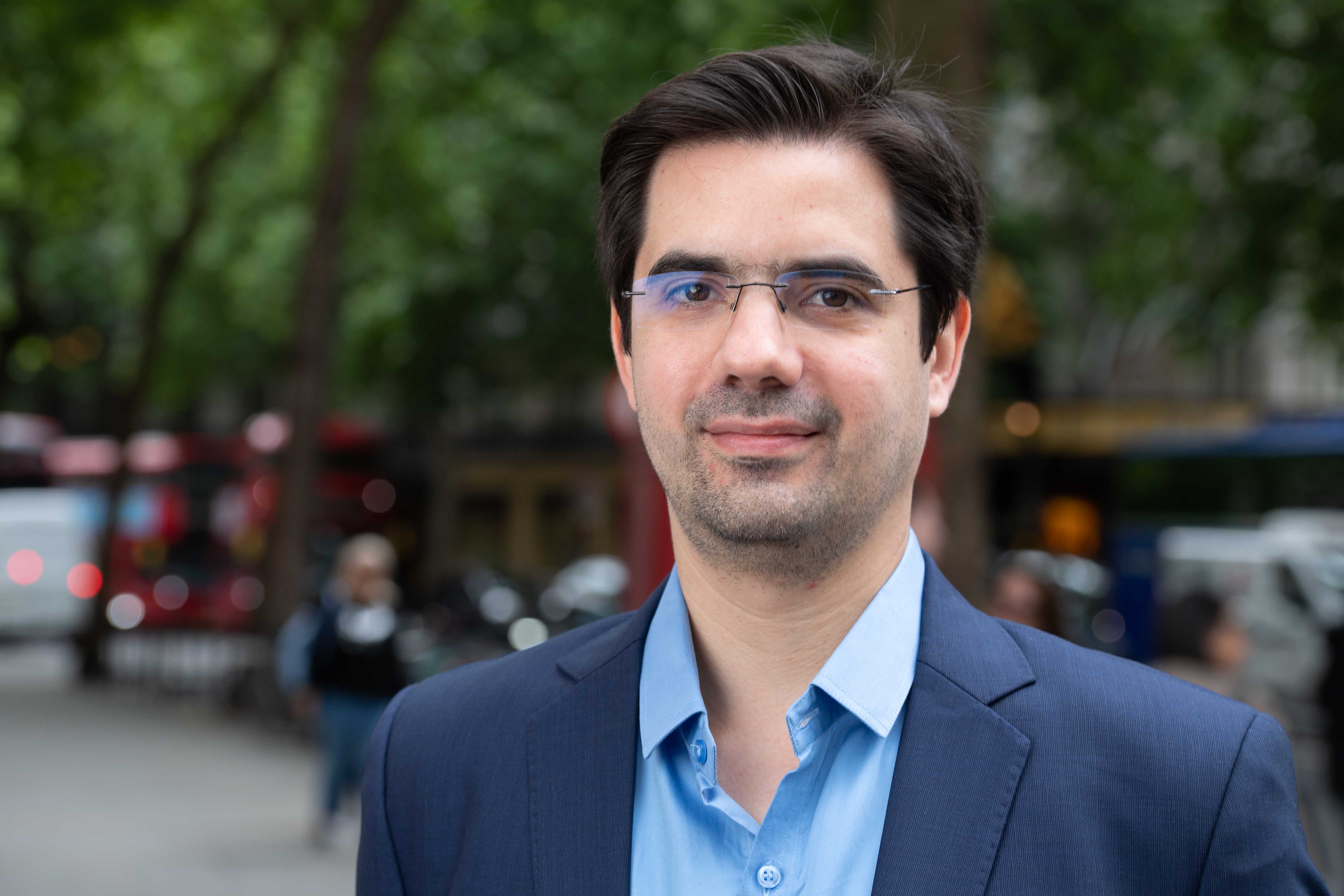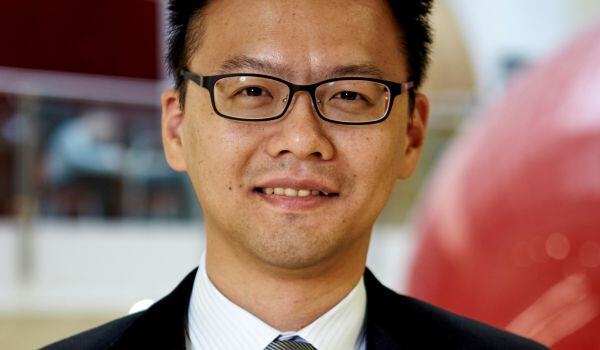Online, part-time
Global Human Resource Management MScBecome a confident HR leader and navigate global HR challenges with our fully online MSc.
.png?width=98&height=71&name=CIPD_Approved%20Centre_Dark%20Purple_RGB-01%20(2).png)
King's College London is a CIPD Accredited Programme Provider. Our Global HRM MSc is mapped to the CIPD Profession Map. On successful completion of this master's and with active CIPD membership, you'll receive Associate Membership (Assoc CIPD). You may also be eligible to upgrade to Chartered Member or Chartered Fellow, depending on your experience.
Key information
|
Study mode: |
100% online |
|
Duration: |
2 years, part time |
|
Next start date: |
19 January 2026 |
|
Application deadline: |
8 December 2025 |
|
Intakes: |
January, May, and September 2026 |
|
Tuition fees: |
£20,232* |
(funding options and instalments are available)
These tuition fees may be subject to increases in subsequent years of study, in line with King's terms and conditions.
* Depending on your country of residence, you may also have to pay Goods and Services Tax (GST) in addition to your tuition fees. You can find further information on the King's Goods and Services tax page.
Course overview
Ready to build your leadership skills and move into strategic, global HR positions? This online master’s degree gives you the expertise to get there.
Developed by experts at the triple-crown accredited King’s Business School, the curriculum provides the advanced knowledge and skills necessary to excel in international HR.
Throughout your studies, you’ll gain a deep understanding of cross-border HR practices and strategies. Equipped with this global vision, you’ll be able to develop systems to help line managers effectively manage and motivate diverse teams and drive organisational performance.
You’ll also examine the ethical dimensions of HRM, learning how to promote sustainability and responsible practices within your organisation.
You’ll explore key theories and practical approaches to employee motivation, performance, and wellbeing. Through this, you’ll be able to design HR practices that foster a productive, positive work environment. You’ll also gain critical insights into how workplace dynamics and inequalities are influenced by broader societal and global factors.
Our course culminates in a research and consultancy project, where you’ll apply your knowledge to solve real-world HR challenges. This will ensure that you graduate with the practical experience and global mindset needed to navigate complex HR challenges with confidence.
Apply nowWho is this course for?
- Ideal for those seeking to progress into leadership roles in global HR.
- Suitable for individuals aiming to become decision-makers in both generalist and specialist HR roles.
- Designed for individuals ready to lead HR strategy, manage diverse teams, and drive global organisational performance.
- Perfect for those passionate about promoting ethical, sustainable, and responsible HR practices globally.
Why choose this online MSc?
Expand your global HR perspective
Gain a deep understanding of HR practices through diverse case studies and expert insights.
Cutting-edge HR research
Learn from King's Business School faculty who are actively shaping global HR practices.
Global networking opportunities
Connect with HR professionals worldwide, enhancing your learning and career prospects.
In-depth consultancy project
Tackle a real-life global HRM issue, applying theories and practices in a group consultancy challenge.
Hear from the academic team
King's College London academics explore how the online Master's in Global Human Resource Management prepares professionals for leadership in a global workforce.
They highlight key modules, flexible online study, and the programme’s CIPD accreditation, making it ideal for those advancing in HR or transitioning into the field. Watch to see how King's can shape your future in international HR.
Dr Penny Simpson: How do you build a team that spans continents, cultures, and time zones? What's the key to managing talent in a global marketplace? Our masters in Global Human Resource Management here at King's College London is designed to prepare you for the challenges of HR management in a global context.
Dr An Nguyen: Our approach doesn't just teach theory. It equips you with cutting edge research and the practical skills to solve real world challenges in global HR. This will give you the edge to lead in a rapidly evolving business environment.
Dr Penny Simpson: This programme has also been accredited by the Chartered Institute of Personnel Development in the UK. This makes our program perfect for HR professionals aiming to advance their careers as well as senior managers looking to integrate HR expertise into strategic decision making. It's also ideal for those wanting to move into the HR field integrating their expertise from other disciplines.
Professor Michael Clinton: Our ten module programme equips you with the HR expertise to thrive in today's global workforce. From managing international teams in HRM in practice, to data driven decision making in HR data and analytics. You'll tackle real world challenges. Modules like leadership and change and strategic HRM focus on ethics and sustainability, shaping you for senior HR roles with sharp and strategic and leadership abilities. Graduates are prepared for leadership roles in HR, such as HR manager, consultant, or director. The skills you gain will set you apart in the global job market, whether advancing in your current role, changing industries, or starting a new HR career. You'll also join our prestigious network of King's alumni, opening doors to opportunities worldwide.
Joseph Waterfield: Studying online with King's gives you a world class education from anywhere. Accessing materials in our virtual learning environment and study flexibly at your own pace, balancing work and life. Join a global community of professionals, engaging in interactive classrooms and collaborative projects that enrich learning and offer valuable networking opportunities. Our dedicated student support team are on hand seven days a week to guide you from welcome to graduation, providing proactive check ins, progression advice, and signposting to key services. They're here for you every step of the way.
Dr An Nguyen: Get in touch with us to find out more about our programme and start your journey today with King's College London. Your future in global human resource management starts here.
What you'll study
Research-led and industry-driven, this course explores key areas such as developing strategic HR aims, maintaining wellbeing at work, and selecting, motivating and developing staff. You’ll be challenged to analyse both UK and international case studies through a critical lens.
Several of our modules include both academics and HR practitioners as speakers, so your expertise will be informed by multiple HRM stakeholder perspectives. Our goal is to help you cultivate a broad, rounded vision of HR.
Our curriculum is designed to equip you with the core competencies, behaviours, expertise and specialist knowledge recommended by leading industry bodies. These include the Society for Human Resource Management (SHRM) and the Chartered Institute of Personnel and Development (CIPD).
You’ll cover multiple facets of HR, including leadership, learning and development, recruitment and selection, talent management, consulting, employment relations, change management, and ethical HR practice. Our curriculum also reflects the latest HR developments, such as the growing use of HR data and advanced analytics for strategic workforce planning.
Module overview
This online MSc is comprised of 10 modules, nine 15-credit core modules and one 45-credit core module (180 credits in total). All modules on the course are core and compulsory, and must be passed to complete the award. King’s College London reviews the modules offered on a regular basis to provide up-to-date, innovative and relevant programmes of study. Therefore, modules on offer may change from year to year.
In this module, you’ll be introduced to the core domains of HRM in practice including employee resourcing, employee reward, training and development, talent management, performance management and employee engagement. You’ll also explore the strategic role of the HR function and examine HRM from an international perspective, considering a range of dilemmas faced by HRM practitioners and line managers.
You’ll examine these topics from a critical, evidence-based perspective and apply relevant theories to understanding practical HRM situations. The module is also designed to help you develop key people management skills and competencies required in a global context.
In this module, you’ll address issues on employee motivation, performance, and wellbeing. You’ll cover theories and human resources management practices for employee motivation, performance, and wellbeing.
Specifically, you’ll cover principles and practices for performance management, including job analysis, performance measurement, evaluations, and feedback. You’ll be introduced to motivation theories, including reinforcement theory, need theory, self-determination theory, expectancy theory, goal-setting theory, and equity theory, to understand the motivational mechanism behind work performance from different angles.
Meanwhile, you’ll also discuss motivation practices, such as compensations, rewards, and job design, for how managers and organisations can shape employee motivation, performance, and wellbeing.
Finally, you’ll address two important topics on employee wellbeing, workplace stress and work-life balance, by discussing theories and human resource management practices on stress management and flexible work arrangement.
You’ll have opportunities to apply what you learn to analyse cases reflecting real-world managerial issues from different angles, including different stakeholders' perspectives. You’ll also be offered activities to reflect on your work experiences and apply the knowledge learnt from the module to your work contexts.
In this module, you’ll gain a critical perspective on the employment relationship, including how it's inherently conflictual, with tensions between managers and workers. You'll discover that the employment relationship encompasses different actors, including trade unions, governments, managers, and employees. You’ll also learn that across different countries and contexts, different institutions impact the employment relationship and its actors, and this has implications for inequality.
You’ll cover the unequal employment relationship and the role of industrial relations and institutions in relation to work and organisations. You’ll develop an understanding of how this impacts diversity and inclusion, wage inequality, job quality and skills. You’ll look at macro perspectives and how these impact the workplace.
You’ll gain a critical appraisal and an appreciation of a sociological perspective that tackles inequality, along with an understanding of how micro-HR initiatives can alleviate some inequalities. Therefore, you’ll see how different theories, cases and evidence relate to employment relations.
In this module, you’ll be introduced to the use of data analytics in global HRM. You’ll focus on the strengths, weaknesses, opportunities, and risks presented by data analytics, including ethical implications of these practices. You’ll learn how to carry out quantitative and qualitative analyses, how to interpret the outputs from these processes, and how to effectively communicate the findings to key stakeholders in order to positively impact organisational decision-making, strategy development and policy implementation. The module is designed to develop key skills in contemporary digital technologies, analysis, and communication.
The global context of HRM challenges us to consider how national culture and regional institutions shape management practices, employment opportunities and work-related experiences. It further offers unique sets of opportunities and constraints for multinational corporations (MNCs) for running their business and managing international human resources.
This module is designed to help you understand how, and to what extent, national institutional characteristics shape the design and impact of HRM-related policies and practices. You’ll analyse MNC's international strategies, the role of culture and institutions in HR-related variations between countries, and the impact of globalisation on workers around the world.
In this module, you’ll be introduced to both research methods and consultancy skills which can then be used to analyse and resolve management and HRM problems and explore business opportunities. The emphasis will be on evidence-based and problem-based learning. With research methods, you’ll be introduced to, and expected to apply, a range of research methodologies and methods.
This module will also critique different frameworks of consultancy. You’ll be introduced to consultancy theory and tools and expected to develop process awareness, understanding and consulting skills through various practical activities and applications.
In this module, you’ll focus on the role of leadership in organisational change management. You’ll first cover theories and perspectives of leadership, including trait, behavioural, contextual, and relational perspectives, approaching leadership from different angles.
Next, you’ll discuss organisational change from a process perspective. You’ll be introduced to a process model of change and use this as a framework to discuss the importance of stakeholder management, communication, reactions to change, learning and culture, and employee proactivity in the change process.
You’ll examine the role of leadership in change under each topic of change management. You’ll be provided opportunities to apply the knowledge learned from the module to analyse cases reflecting real-world issues in organisational change management across different business and geographical settings. You’ll also be offered activities to reflect on your work experiences and apply the knowledge learned from the module to your work contexts.
In this module, you’ll examine strategic and contemporary HRM that is applicable to a global context. You’ll consider Strategic HRM as compared with more operational HRM and critically consider the strategic role of HRM in addressing current organisational challenges and dilemmas.
You’ll examine strategic and contemporary HRM from a critical, evidence-based perspective and apply relevant theories to understanding practical Global HRM situations. The module is also designed to promote your global mindset, with the development of a range of key people management skills and competencies required in a national and international context.
In this module, you’ll explore Responsible HR and Sustainability to develop your insight into the important internal and external contribution that HR can make.
In addition to considering the employee and organisational perspective, you’ll locate HRM within its broader societal and environmental context. Examining challenges from a critical and strategic, evidence-based perspective you’ll apply relevant concepts and theories to build your skills to ensure that you’re well placed to lead the way in enhancing Global HRM, for example with promoting Equality, Diversity and Inclusion, and Green HR.
The module is designed to develop your global mindset and key people management skills and competencies required in a global context, including ethical decision making, adaptive communication, and problem-solving.
This practice-based module gives you the opportunity to undertake research into, and consultancy on, a specific HRM organisational problem. It’s designed to give you experience in defining and researching a specific academic topic in HRM, building on subject knowledge and professional insights and skills gained through taught modules.
You’ll apply methodological principles and consulting skills developed on the Research and Consulting Skills in HRM module. This will involve original research, the application of research techniques (including quantitative or qualitative approaches), the use of intervention styles in consultancy, and evidence of problem-solving skills to address the business issue with actionable recommendations. The module requires you to apply a global mindset.
How you're assessed
Assessments are designed to test your knowledge, understanding and critical awareness of the topics discussed during the course, as well as your ability to analyse and apply specialist knowledge to practice. The assessment type may vary between modules.
However, they’re likely to include one or more of the following forms:
Written coursework
Written coursework
Online exams
Online exams
Group presentations
Group presentations

On-campus student testimonial
"The course was a good introduction to the broad field of HR, the business case for the function and the theory behind it. At the time it helped me to have more context for the world I was working in and how I could help my clients, as well as how to think more critically about my work."
Kate Adams
Alumni, on-campus Human Resource Management & Organisational Analysis MSc
Entry requirements
A 2:2 honours degree in a related area.
If you have a lower degree classification, or a degree in an unrelated subject, your application may be considered if you can demonstrate significant relevant work experience, or offer a related graduate qualification (such as a master's or PGDip).
Even if you don’t meet the standard entry requirements, your application will be considered and assessed on a case-by-case basis.
For example, you may be offered a place with a lower degree qualification if you bring with you relevant work experience and/or professional qualifications. You may be offered a place if you performed exceptionally well in an unrelated degree.
English language band: D
To study at King's, it is essential that you can communicate in English effectively in an academic environment. You’re usually required to provide certification of your competence in English before starting your studies.
Nationals of majority English speaking countries (as defined by the UKVI) who have permanently resided in this country are not usually required to complete an additional English language test. This is also the case for applicants who have successfully completed:
- An undergraduate degree (at least three years duration) within five years of the course start date.
- A postgraduate taught degree (at least one year) within five years of the course start date.
- A PhD in a majority English-speaking country (as defined by the UKVI) within five years of the course start date.
For information on our English language requirements and whether you need to complete an English language test, please see our English Language requirements page.
You'll need to submit a personal statement and two reference letters as part of your application.
You’ll also need to submit a copy (or copies) of your official academic transcript(s), showing the subjects studied and marks obtained. If you have already completed your degree, copies of your official degree certificate will also be required. Applicants with academic documents issued in a language other than English, will need to submit both the original and official translation of their documents.
You’ll need to submit your CV as part of your application to highlight your experience.

Not sure if you meet the requirements, or if the course is right for you? Speak to our team to get tailored support:
Discuss my optionsHear from a student
Meet Federica from Seattle, who is studying this MSc online at King’s. She shares how learning alongside classmates from Hong Kong, Egypt, the UK and beyond has opened her eyes to how dramatically labour laws differ around the world, and why that global perspective is essential for her future in HR.
My name is Federica Dennis. I'm from Seattle, Washington. I'm studying the Global Human Resource Management degree online in the master's programme.
This programme hit a lot of marks for me with global HR. I want to learn about different laws and rules around the world besides the US, like China and the UK. It is a two year programme with people from all over the world. I have classmates from Hong Kong, from Egypt, from the UK. It was amazing, so that made me choose it.
When we have meetings in groups about topics, we bring all these different perspectives and different laws. If we have a topic about labour rights, everyone shares from their region and you are amazed to find out how different the laws are. Everything varies, from minimum wage to legal structures to labour protections, and you learn so much from the group. For me, that is the most impressive thing in the programme so far.
For me, the labour laws stand out. I have lived in four countries but worked in HR in only two, and I am amazed at how vast and different the laws are even for simple things. We have discussions in class all the time about maternity leave, for example. If a person has a baby, the differences around the world are huge.
In some places, you can take one year off with no issues. In others, it is three months or even just a few weeks. Learning how HR crosses borders and adapts to different legal systems is fascinating, and it will help me in the future. If I want to help people in different countries, I need to know the laws. I cannot work in a country without understanding them.
So that has been my most fascinating part.
When I applied for the programme, I told the whole committee I wanted to start a business. And I did that. I left my corporate jobs, got a licence, and I now have a company called OPC. It helps people move around the world to work. If you are in China or Barbados and want to move to another country, we help you get there. After graduation, I want to enter a PhD programme because I want to dive deeper into global HR.
My advisor answered all the concerns I had. When I came into the programme, I wondered what I could do with it and how I could pursue a PhD afterward. I asked about the modules, how I would be graded, how I could stay competitive and challenge myself. She supported me from the beginning and even told me about the AKC programme.
I really think she is one of the best advisors I have ever had. She talks about personal goals and family, and without advisors, we would be lost because of the distance and time zones. Sometimes you feel unsure, wondering if you are in the right place. They keep you on track, which is really helpful.
Meet your academic team
Guest speakers from the HRM industry include:

Dr Duncan Brown
Independent adviser, Principal Associate, Institute for Employment Studies

Dr Abigail Gilbert
Co-Director, Institute for the Future of Work (IFOW)

Steve Bryan
Director of People and Engagement, NEST

Tim Craddock
HR Director, Group Reward, Pensions & Benefits, Network Rail
Career options in Global HR Management
Our Global HRM MSc is designed to accelerate your career by equipping you with the skills and knowledge needed for senior HR leadership roles with a global focus. As a graduate, you'll be well-prepared for positions such as Global HR Manager, Director of Global HR, or Chief People Officer (CPO). In these roles, you'll lead HR strategy and operations across multiple regions, managing diverse teams and aligning HR practices with global business objectives.
This course is also tailored to support your transition from operational to strategic HR roles. You'll gain the ability to align HR initiatives with broader business strategies. This will make you an asset in roles like Strategic HR Business Partner or Global HR Consultant, where strategic thinking in an international context is key.
Finally, our Global HRM MSc prepares you for impactful roles within multinational corporations. You'll develop the expertise needed to manage a global workforce, navigate cultural differences, and implement HR strategies across various regions. Career outcomes include positions such as Global Talent Manager or Regional HR Director, where your ability to understand and manage the complexities of a global HR landscape will be crucial.
Graduates of the on-campus Human Resource Management & Organisational Analysis MSc have progressed to senior roles in organisations including Amazon, L’Oreal, Save the Children, Standard Chartered, Experian and Viacom, among others.
FAQs for Global Human Resource Management MSc
Programme overview
You’ll explore strategic HR, leadership, talent management, recruitment and selection, learning and development, change management, employment relations and ethical practice.
The programme also covers emerging areas such as HR data and analytics, with insights from both academics and practitioners to give you a well-rounded, global perspective.
Programme structure
This is a 100% online programme, delivered over two years part-time.
The programme is designed to fit around professional commitments, allowing you to study flexibly through King's College London's virtual learning platform, KEATS.
The programme is two years, part-time. This flexible schedule is perfect for professionals looking to balance their studies with work.
Entry requirements
You’ll typically need a 2:2 honours degree in a related area.
If you have a lower degree classification, or a degree in an unrelated subject, your application may be considered if you can demonstrate significant relevant work experience, or offer a related graduate qualification (such as a master's or PGDip).
Full details are listed in the ‘Entry Requirements’ section of this page.
Assessments
Assessment varies by module but typically includes written coursework such as essays and reports, online exams, and group presentations, all designed to test your knowledge and ability to apply it in practice.
Careers
Graduates are equipped for senior roles such as Global HR Manager, Chief People Officer, Strategic HR Business Partner or Global HR Consultant, as well as leadership positions in multinational organisations including Global Talent Manager and Regional HR Director.
Student support
Throughout your studies, a dedicated Student Success Advisor will be on hand to guide you, alongside access to academic workshops and digital skills training.
Together, these resources help you succeed in online learning and prepare for the next step in your career.
How to apply
Applications are currently open for the next intake. You can apply online via the King’s College London application portal, apply.kcl.ac.uk.
Early application is recommended.
Ready to join us in 2026?
Discover more



You have the potential. We’ll help you unleash it. Take charge of your future today.
Questions about our courses, studying online or the application process? Our expert Enrolment Advisors are on-hand to help. Simply fill in the form below, and they’ll get in touch with you shortly.
Fields with a '*' are mandatory.

.png)




